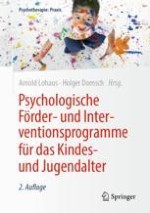2021 | OriginalPaper | Buchkapitel
24. Elterntrainings
verfasst von : Nina Heinrichs
Erschienen in: Psychologische Förder- und Interventionsprogramme für das Kindes- und Jugendalter
Verlag: Springer Berlin Heidelberg
 Chronisch-entzündliche Darmerkrankung
Chronisch-entzündliche Darmerkrankung
 COVID-19-Update
COVID-19-Update
 Diabetes
Diabetes
 Hautpflege
Hautpflege
 Klima & Gesundheit
Klima & Gesundheit
 Hygiene
Hygiene
 Intensivpflege
Intensivpflege
 Kardiologische Pflege
Kardiologische Pflege
 Mobilisation
Mobilisation
 Nachhaltigkeit
Nachhaltigkeit
 Nierenerkrankungen
Nierenerkrankungen
 Obstipation
Obstipation
 Onkologische Pflege
Onkologische Pflege
 Palliativpflege
Palliativpflege
 Schmerz
Schmerz
 Sucht in der Pflege
Sucht in der Pflege
 Vielfalt, Gleichberechtigung und Inklusion
Vielfalt, Gleichberechtigung und Inklusion
2021 | OriginalPaper | Buchkapitel
verfasst von : Nina Heinrichs
Erschienen in: Psychologische Förder- und Interventionsprogramme für das Kindes- und Jugendalter
Verlag: Springer Berlin Heidelberg
Print ISBN: 978-3-662-61159-3
Electronic ISBN: 978-3-662-61160-9
Copyright-Jahr: 2021
